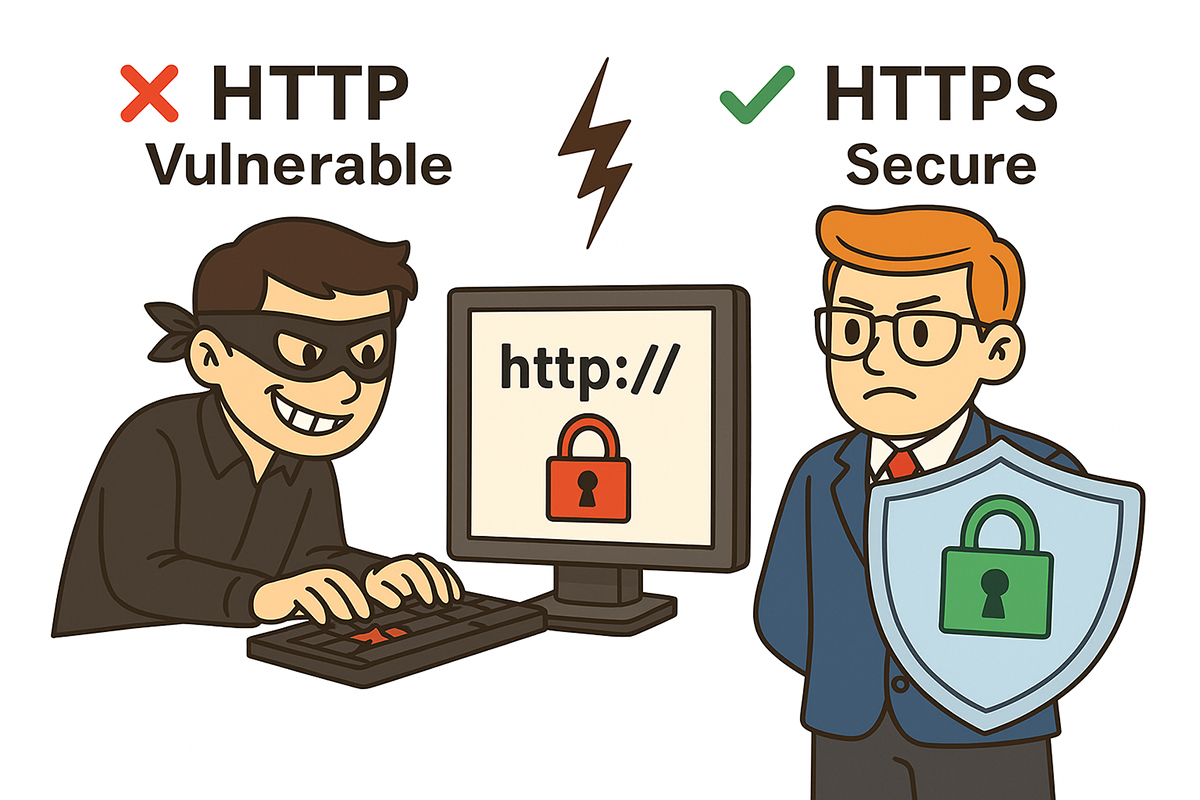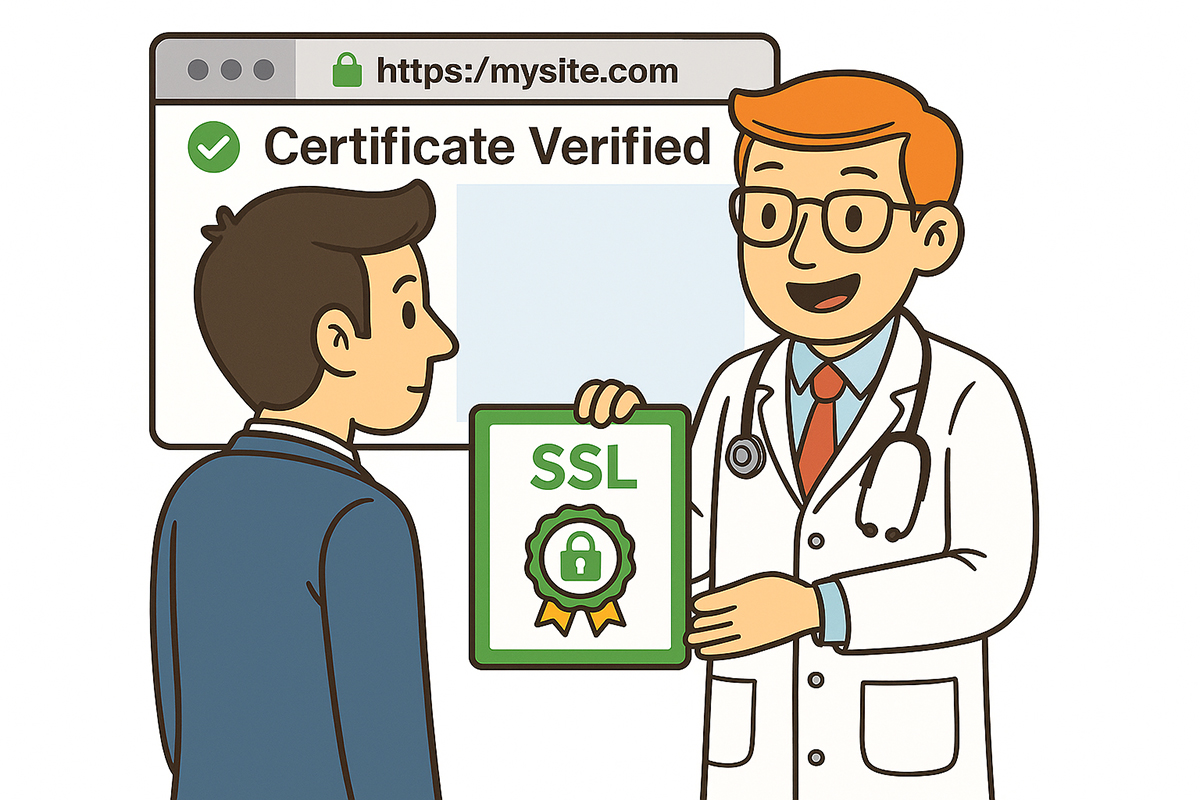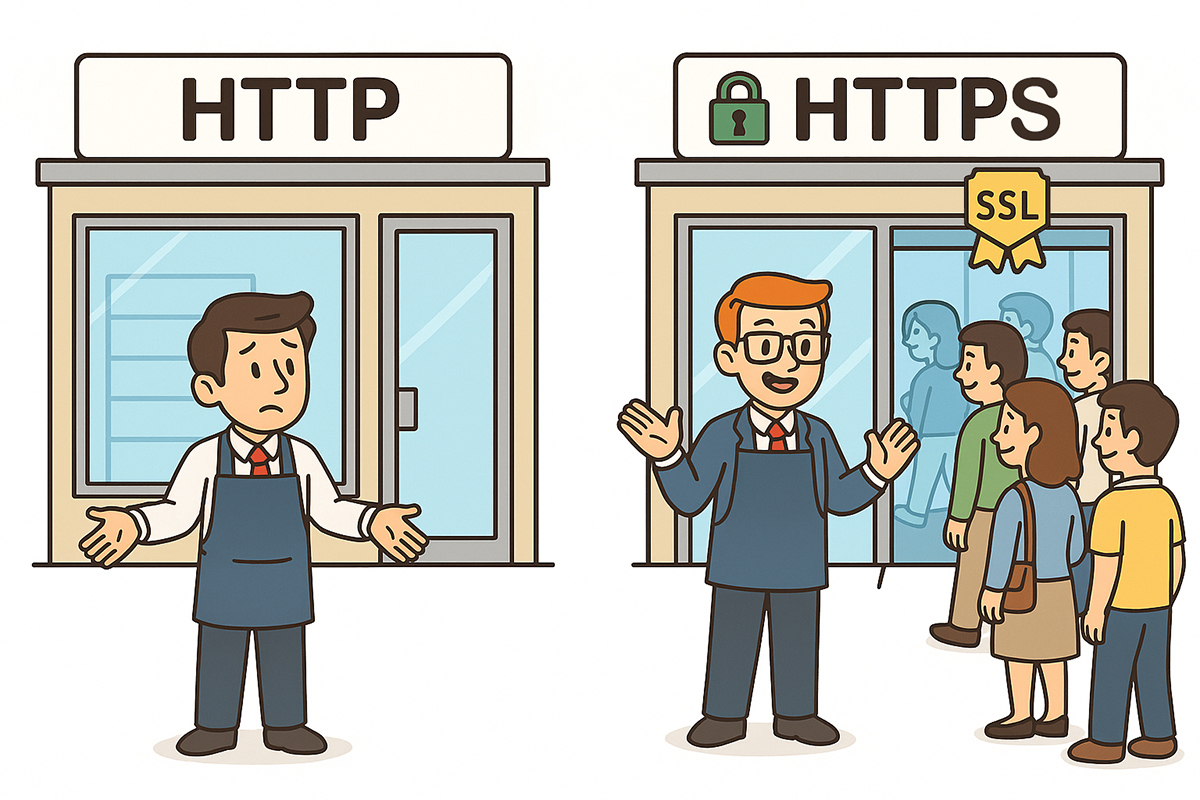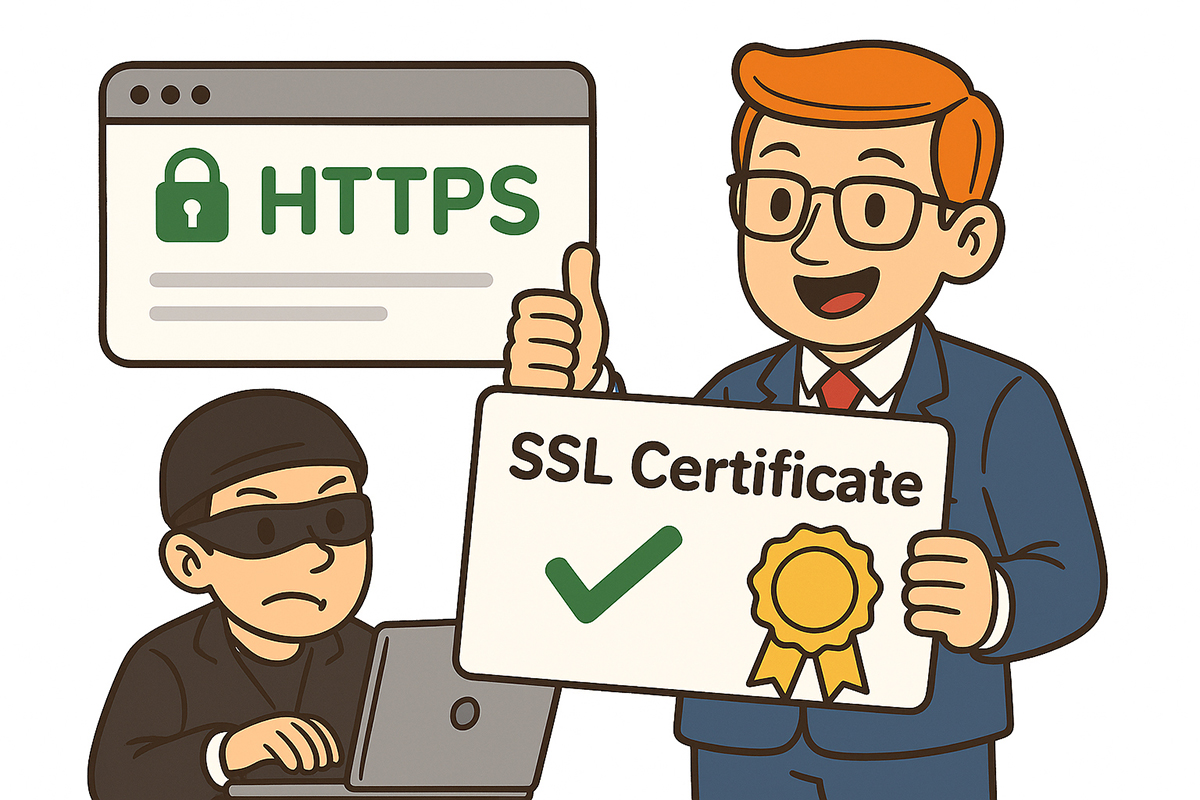Have you ever noticed that little padlock icon next to the URL when you visit a website? It's not just a visual detail: it's the difference between a secure site and one that Chrome marks as "Not Secure." It's the difference between customers who trust you and customers who run away!
The Cost of Insecurity
Maria had a jewelry e-commerce site that was working well. Until Chrome started showing "Not Secure" in the address bar. Result? -60% sales in 3 months. Customers no longer trusted entering their credit card information.
She fixed it by installing SSL and recovered everything in 2 weeks. But the reputational damage took months to heal.
Table of Contents
- HTTP vs HTTPS: the difference that changes everything
- What is an SSL certificate
- How SSL works: the magic of encryption
- Types of SSL certificates: which to choose
- SEO impact: why Google loves HTTPS
- User trust: psychology of security
- How to install SSL: practical guide
- Most common SSL errors and how to fix them
- Your action plan

HTTP vs HTTPS: The Difference That Changes Everything
Before talking about SSL, let's understand the fundamental difference between HTTP and HTTPS. It's like the difference between sending a postcard and a letter in a sealed envelope.
📮 HTTP: The Open Postcard
HTTP (HyperText Transfer Protocol) is the "language" that browsers and servers use to communicate. But it's completely in plain text!
What "plain text" means:
- Every piece of data sent is readable by anyone who intercepts it
- Passwords, emails, payment data travel without protection
- Hackers can easily steal sensitive information
- There's no guarantee you're talking to the right website
🔒 HTTPS: The Armored Envelope
HTTPS (HTTP Secure) is the secure version of the same protocol. Every communication is encrypted!
What changes with HTTPS:
- All data is encrypted with military-grade algorithms
- Even if intercepted, data is unreadable
- Website identity certification
- Protection against data tampering
🔍 Practical Comparison: What a Hacker Sees
❌ With HTTP
Host: yoursite.com
Content-Type: application/x-www-form-urlencoded
email=john@email.com&password=password123&card=4532-1234-5678-9012
Everything readable! The hacker easily intercepts email, password and credit card in plain text.
✅ With HTTPS
16 03 03 00 2a a7 b4 c9 d2 f1 8e 3c
4f 6b 9a 2d 8c 7e 5f 91 4b 2a 6d 3c
e8 f4 a9 5c 7b 2e 9f 1d 6a 4c 8b 7f
3e 9c 2a 5d 8f 4b 6e 91 2c 7a 5f 3d
Encrypted data! The hacker sees only incomprehensible encrypted bytes, even if they intercept the traffic.
The Uncomfortable Truth
Many think "My site doesn't handle payments, HTTPS isn't needed." WRONG!
Even a simple contact form without HTTPS allows malicious actors to:
- Steal your customers' emails and messages
- Intercept admin login credentials
- Modify the content users see
- Inject malware into pages
What is an SSL Certificate
SSL (Secure Sockets Layer) is like a "digital ID card" for your website. It guarantees that you are really you and enables secure communications.
SSL as Digital Identity Card
Imagine meeting someone who claims to be a doctor. How do you verify it? You ask to see their medical board ID!
The same works online:
- The SSL certificate = The website's professional badge
- The certificate authority = The professional board that issued it
- The browser = The patient who checks if the badge is authentic
- The green padlock = The confirmation "this doctor is verified"
📋 What an SSL Certificate Contains
- Domain name: Which site it's valid for
- Owner: Who owns the site
- Certificate authority: Who verified the identity
- Expiration date: Until when it's valid
- Public key: To encrypt communications
- Digital signature: Proof of authenticity
Certificate Authorities (CA)
Not everyone can issue SSL certificates. You need a recognized authority, like Let's Encrypt, DigiCert, or Comodo.
How trust works:
- The authority verifies that you actually own the domain
- Issues a digitally signed certificate
- Browsers have a list of trusted authorities
- If the certificate is signed by a trusted authority, the browser shows the padlock
🟢 Main Authorities
- Let's Encrypt: Free, automatic
- DigiCert: Premium, EV available
- Comodo: Great quality/price ratio
- GlobalSign: For large enterprises
🔴 Warning Signs
- Self-signed certificates
- Unknown authorities
- Expired certificates
- Mismatched domain names

How SSL Works: The Magic of Encryption
Behind the simple green padlock is a complex but elegant process. Let's see what happens when you visit an HTTPS site:
Client Hello
Your browser tells the server: "Hi, I want a secure connection. These are the encryption methods I know."
Server Hello + Certificate
The server responds: "OK, let's use this method. Here's my SSL certificate to prove who I am."
Certificate Verification
The browser checks the certificate: Is it valid? Is it issued by a trusted authority? Does the domain match?
Key Exchange
Browser and server agree on a unique "session key" to encrypt this conversation.
Secure Communication
From now on, all data travels encrypted with the session key. Only browser and server can decrypt it.
The Two Types of Encryption
SSL uses a hybrid system that combines two approaches for maximum security and speed:
🗝️ Asymmetric Encryption
Uses two keys: one public and one private
- The public key encrypts data
- Only the private key can decrypt it
- Used for initial key exchange
- More secure but slower
🔑 Symmetric Encryption
Uses a shared key between browser and server
- The same key encrypts and decrypts
- Very fast in processing
- Used for data transfer
- Secure if the key remains secret
💡 Why Two Systems?
It's like having a safe with two locks: a super-secure one to exchange initial keys, and a fast one for daily use. You get both maximum security and optimal performance.
Types of SSL Certificates: Which to Choose
Not all SSL certificates are the same. It's like choosing between a regular license, commercial license, or pilot license: it depends on what you need to do!
Domain Validated (DV)
The "basic" but effective certificate
What it verifies: Only that you own the domain
Issue time: Few minutes
Cost: $0-50/year
✅ Advantages:
- Quick to obtain
- Cheap or free
- Same encryption as others
- Perfect for most sites
❌ Limitations:
- Doesn't verify company identity
- Basic padlock, no special indicator
Perfect for: Blogs, business sites, small e-commerce
Organization Validated (OV)
The "professional" certificate
What it verifies: Domain + legal existence of the company
Issue time: 1-3 days
Cost: $50-200/year
✅ Advantages:
- Verifies company identity
- Greater customer trust
- Shows company info in certificate
- Great for B2B business
❌ Limitations:
- Requires business documentation
- Longer verification process
- Higher cost
Perfect for: Established companies, B2B portals, institutional sites
Extended Validation (EV)
The "luxury" certificate
What it verifies: Complete identity and legal authority verification
Issue time: 1-2 weeks
Cost: $200-1000/year
✅ Advantages:
- Green bar in browser (in some)
- Company name visible in URL bar
- Maximum user trust
- Protection against phishing
❌ Limitations:
- Very long and complex process
- High cost
- Requires extensive documentation
- Not all browsers show green bar
Perfect for: Banks, large e-commerce, financial services
Special Certificates
Besides the three main types, there are certificates for specific needs:
🌐 Wildcard SSL
For all subdomains
- Covers *.yourdomain.com
- shop.yourdomain.com ✅
- blog.yourdomain.com ✅
- app.yourdomain.com ✅
Price: $100-500/year
📋 Multi-Domain SSL
For multiple different domains
- yourdomain.com ✅
- yourdomain.net ✅
- anotherdomain.com ✅
- Up to 100 domains
Price: $200-800/year
AlphaWeb's Recommendation
For 90% of cases: Free DV from Let's Encrypt
Reasons:
- Same cryptographic security as others
- Google and users see the same green padlock
- Automatic renewal = zero hassle
- Savings to invest in other optimizations
Upgrade to OV/EV only if: Your business heavily depends on certificate "prestige" perception (banks, jewelry, financial services)
SEO Impact: Why Google Loves HTTPS
Google doesn't hide its preference for HTTPS. Since 2014 it's officially a "ranking signal," and in 2025 it's practically mandatory for good rankings.
HTTPS as a Ranking Factor
Google has been clear: "HTTPS is a lightweight ranking signal." But what does this mean in practice?
📊 The Data Speaks Clearly
- 2018: 68% of first-page sites use HTTPS
- 2021: 84% of first-page sites use HTTPS
- 2025: 98%+ of top sites use HTTPS
- HTTP sites: Increasingly rare in Google results
🎯 Direct Impact
- Ranking boost: +2-5 average positions
- Trust signals: Better E-A-T score
- Core Web Vitals: HTTPS is faster
- Mobile-first: Required for AMP
📈 Case Study: HTTP → HTTPS Migration
Client: Law firm with 2,000 indexed pages
Results 3 months after HTTPS migration:
- +23% overall organic traffic
- +15% average positions for main keywords
- +31% click-through rate (more trust = more clicks)
- -18% bounce rate (reassured users stay longer)
HTTP/2 and Performance
HTTPS isn't just security: it enables HTTP/2, a much faster protocol that only works with SSL.
🌐 HTTP/1.1 (without SSL)
- One request at a time per connection
- 6-8 parallel connections max
- Uncompressed headers
- No prioritization
🚀 HTTP/2 (requires SSL)
- Multiplex: hundreds of simultaneous requests
- Single TCP connection
- Smart header compression
- Server push for critical resources
Practical result: HTTPS/HTTP2 sites load 30-50% faster than HTTP/1.1 ones, and Google rewards speed!
Indirect But Crucial Signals
HTTPS improves metrics that Google uses to evaluate site quality:
📉 Bounce Rate
Users trust more → stay longer → positive signal for Google
⏱️ Time on Site
No "Not Secure" warnings → better experience → more time on site
🔄 Return Visitors
Trustworthy site → users return → domain authority grows
User Trust: Psychology of Security
Beyond technical aspects, SSL has a huge psychological impact. Users have learned to recognize security signals, and they use them to decide whether to trust.
The Psychology of the Green Padlock
The human brain makes trust decisions in milliseconds. Here's what influences security perception:
✅ Trust Signals
- Green padlock: "This site is secure"
- HTTPS in URL: "My data is protected"
- No warnings: "I can proceed safely"
- Fast loading: "It's a professional site"
❌ Warning Signals
- "Not Secure": "Better not enter data"
- HTTP in URL: "Amateur site?"
- Browser warnings: "Dangerous site!"
- Slow loading: "I don't trust this"
⚠️ Chrome's "Not Secure" Warning
Since 2018, Chrome shows "Not Secure" for all HTTP sites. Other browsers follow the same path.
Real impact:
- 84% of users abandon when they see "Not Secure"
- 92% never enter personal data on HTTP
- 67% think the site is "hacked"
E-commerce: Trust is Worth Gold
For e-commerce, SSL isn't just technical: it's business-critical. The correlation between perceived security and conversions is direct.
🛒 E-commerce and SSL Statistics
📊 Conversion Data
- +18.3% conversions with EV SSL vs DV
- +23.6% cart completion with HTTPS
- -41% checkout abandonment
- +15% average order value (more trust = more spending)
💰 Economic Impact
- E-commerce 10k visitors/month
- Conversion rate: 2% → 2.5%
- Orders: 200 → 250 (+25%)
- +€12,500/year revenue
Mobile: Security Even More Critical
On mobile, trust is even more important: small screen, public connections, less visual control.
📱 Mobile Behavior
- Users look less at the URL
- They trust visual indicators more
- They abandon more easily if unsure
- Often use public WiFi (insecure)
🔒 SSL Mobile Importance
- Protection on public WiFi networks
- More evident security indicators
- More noticeable HTTP/2 performance
- AMP requires HTTPS mandatorily
The "Security Native" Generation
Millennials and Gen Z grew up with the internet and are extremely sensitive to online security. For them, a site without HTTPS is simply "broken".
Interesting data:
- 78% always check the padlock before purchasing
- 89% never enter passwords on HTTP
- 45% abandon immediately if they see "Not Secure"
- Your customers' average age decreasing? SSL becomes even more critical!

How to Install SSL: Practical Guide
Installing SSL seems complicated, but with modern tools it's become much simpler. Let's see the main options:
Option 1: Automatic SSL (Recommended)
The modern solution for 90% of cases
🚀 Providers with Automatic SSL
- Cloudflare: Free SSL, 1-click activation
- SiteGround: Automatic Let's Encrypt included
- Kinsta: Automatic SSL on all plans
- WP Engine: SSL included and managed
✅ Advantages
- Automatic installation
- Automatic renewal
- Zero technical configuration
- Support included
Access hosting panel
Login to your provider's control panel (cPanel, Plesk, proprietary panel)
Find SSL section
Look for "SSL", "Let's Encrypt", "SSL Certificates" or "Security"
Activate SSL for domain
Select the domain and click "Activate SSL" or "Install SSL Certificate"
Configure HTTPS redirect
Enable "Force HTTPS" or "Redirect HTTP to HTTPS" option
Verify installation
Visit the site with https:// and check that the green padlock appears
Option 2: Manual Installation
For those who want total control or have hosting without automatic SSL
🛠️ Main Steps
1. Obtain Certificate
- Let's Encrypt: Free via Certbot
- SSL Providers: Purchase DV/OV/EV
- Commercial CAs: DigiCert, Comodo, etc.
2. Install on Server
- Certificate upload
- Web server configuration
- Configuration testing
- HTTPS activation
⚠️ Manual Installation: Caution!
Manual installation requires advanced technical skills. Common errors:
- Wrong server configuration → site doesn't work
- Mixed content → broken padlock
- Failed renewal → expired certificate
- Misconfigured redirects → SEO loss
Option 3: Cloudflare SSL (Easy and Free)
The perfect middle ground: simple as automatic, control like manual
✅ Cloudflare Advantages
- Free SSL forever
- Instant activation
- Global CDN included
- Free DDoS protection
- Detailed analytics
📋 Cloudflare Setup
- Register on cloudflare.com
- Add your domain
- Change domain nameservers
- Enable "Always Use HTTPS"
- Configure "Automatic HTTPS Rewrites"
🎯 Why Cloudflare is Our Choice
For AlphaWeb projects we always use Cloudflare because:
- Free unlimited SSL forever
- +30% performance thanks to global CDN
- Automatic security protection
- Detailed analytics included
- Easy management for end clients
Most Common SSL Errors and How to Fix Them
Even with SSL installed, problems can occur that ruin user experience and damage SEO. Here are the most common ones and how to fix them:
Error #1: Mixed Content
The problem: HTTPS page loading HTTP resources (images, CSS, JS, videos)
❌ How it manifests
- Gray or broken padlock
- "Connection not secure" warning
- Some resources don't load
- Browser console full of errors
✅ How to fix it
- Use relative URLs: /images/photo.jpg
- Protocol relative: //cdn.site.com/script.js
- Change http:// to https:// in all code
- Use "SSL Insecure Content Fixer" plugin
<img src="http://yoursite.com/photo.jpg">
<script src="http://cdn.jquery.com/jquery.js"></script>
// ✅ CORRECT - All HTTPS
<img src="https://yoursite.com/photo.jpg">
<script src="//cdn.jquery.com/jquery.js"></script>
Error #2: Expired Certificate
The problem: The SSL certificate has expired and hasn't been renewed
🚨 Consequences of Expired Certificate
- Browser shows "Connection not secure"
- Users can't access the site
- Google stops indexing new pages
- Ranking collapse in results
- Total loss of traffic and sales
🔍 How to Prevent
- Use Let's Encrypt with auto-renewal
- Set alerts 30 days before expiration
- Check renewal calendar
- Monitor site with external tools
🆘 How to Fix
- Renew certificate immediately
- Contact hosting provider
- Verify auto-renewal configuration
- Complete test after renewal
Error #3: Domain Name Mismatch
The problem: The certificate is valid but for a different domain
📋 Typical Examples
- Certificate for www.site.com but access from site.com
- Certificate for domain.com but site uses domain.net
- Subdomain not included in certificate
- Development certificate in production
🔧 Solutions
- Wildcard certificate for all subdomains
- Multi-domain SSL for multiple domains
- Automatic redirects to correct version
- Verify DNS configuration
Error #4: Infinite Redirect Loop
The problem: Misconfigured redirects create HTTP ↔ HTTPS loop
1. User visits: http://site.com
2. Server redirects to: https://site.com
3. HTTPS config redirects back to: http://site.com
4. HTTP redirects again to: https://site.com
5. Infinite loop... browser error
🎯 Common Causes
- Conflicting plugins
- Misconfigured htaccess
- Cloudflare + server both force HTTPS
- Wrong proxy configuration
🛠️ How to Fix
- Temporarily disable SSL plugins
- Check .htaccess file
- Verify Cloudflare settings
- Test with cache disabled
Tools to Diagnose SSL Errors
When something doesn't work, these tools help you understand what:
🔍 Testing Tools
- SSL Labs: ssllabs.com/ssltest
- Why No Padlock: whynopadlock.com
- SSL Checker: sslchecker.com
- Google Dev Tools: Console → Security
📊 What They Check
- Certificate validity and configuration
- Complete certificate chain
- Mixed content detection
- Secure protocol configuration
🎯 Our Debug Procedure
- SSL Labs test: A+ grade mandatory
- Why No Padlock: Zero mixed content errors
- Test on 5 different browsers: Chrome, Firefox, Safari, Edge, mobile
- Continuous monitoring: Automatic alerts if something breaks
Your Action Plan
Great! Now you know everything you need about SSL certificates. But knowledge without action doesn't protect your site. Here's what to do concretely, today.
Checklist: Have You Learned How to Protect Your Site with SSL?
Learning Progress
-
Understand the difference between HTTP and HTTPS
-
Know what an SSL certificate is and why it's needed
-
Know the types of SSL certificates and which to choose
-
Understand how SSL helps Google rankings
-
Know why customers trust HTTPS sites more
-
Know the ways to install SSL on your site
-
Can recognize the most frequent SSL errors
-
Can verify if your site has SSL active
Immediate Action Plan
📅 To Do Today (Within 2 Hours)
- Complete site test with the tools indicated above
- Identify problems using the error guide
- Contact your hosting provider if you don't have SSL active
- Backup your site before any changes
📅 To Do This Week
- Install/activate SSL following one of the guides above
- Configure HTTPS redirect for all traffic
- Fix mixed content using debug tools
- Update Google Search Console with new HTTPS version
- Complete final test on all browsers and devices
📅 Ongoing Maintenance
- Monthly monitoring: SSL Labs test + expiration check
- Automatic alerts: Notifications 30 days before expiration
- Regular backups: Before every major update
- Annual review: Evaluate certificate type upgrade
Best Practices for 2025
Go beyond the bare minimum with these advanced optimizations:
🔒 Advanced Security
- HSTS Headers: Force HTTPS forever
- Certificate Pinning: Protection against MITM attacks
- CAA Records: Control who can issue certificates
- OCSP Stapling: Faster certificate validation
⚡ Performance
- HTTP/2 Push: Anticipated critical resources
- TLS 1.3: Faster handshake
- Session Resumption: Reused connections
- CDN with SSL: Secure global distribution
The Future of Web Security
What to expect in the coming years:
- Quantum-resistant encryption: Protection against quantum computers
- Certificate Transparency 2.0: Greater CA transparency
- Automated certificate management: Zero human intervention
- Extended validation evolution: New identity verification standards
- AI integration: Automatic anomaly detection
The winning strategy: Start with solid foundations (HTTPS + monitoring) and add complexity as you grow.
What's Next After SSL Certificate?
SSL Certificate is fundamental for site security. Now you need:
- CMS Systems: All about Content Management Systems → Compare CMS
- Technologies: What's under the hood → Web technologies
Previously you discovered:
- Site development: Turning ideas into reality → Where to start
- Domain: If you don't have one yet → Domain guide
- Hosting: Where to put site files → Read hosting guide
AlphaWeb Guarantee
All sites we develop include SSL as standard with:
- Free SSL certificate Let's Encrypt or Cloudflare
- Automatic configuration HTTPS + redirect + HSTS
- 24/7 monitoring with automatic alerts
- A+ SSL Labs grade guaranteed on all projects
- Automatic renewal forever, zero worries
- Technical support included for any SSL issues
📞 Free SSL consultation: We analyze your site and tell you what you need!
Remember: Web security isn't a luxury, it's a necessity. In 2025, a site without HTTPS is like a store without locks: nobody will trust entering it.
SSL isn't complicated to implement, but it's crucial to do it right. Don't delay: every day you wait is a day your competitors gain advantage over you.
